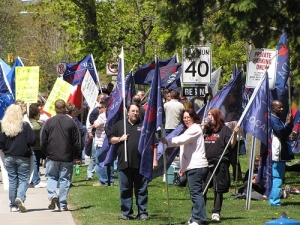
By Andrew Kilpinen
In Gestamp South Carolina, L.L.C. v. National Labor Review Board the 4th Circuit handed down a new decision regarding the validity of recess appointed National Labor Review Board (“NLRB”) member Craig Becker. Additionally, the Court settled an appeal that was originally heard at oral arguments in October of 2013.
NLRB Member Craig Becker’s Appointment Valid
The 4th Circuit had originally vacated the National Labor Review Board’s (“NLRB”) decision because a sitting member of that board, Craig Becker, had been appointed during a Senate recess, and therefore lacked a legal quorum. On appeal, The Supreme Court vacated the 4th Circuit’s decision and remanded the case for further consideration in light of its decision in NLRB v. Noel Canning.
In today’s opinion, the Court held that Craig Becker’s appointment was valid; citing a 10th Circuit opinion in which the court stated that because Craig Becker “was appointed during an intra-session recess exceeding two weeks …, there seems little reason to [now] doubt the validity of [his] appointment.”
Kingsmore and Alexander Alleged Wrongful Termination and Improper Threat
Having dispensed with this threshold question, the Court proceeded to weigh Gestamp’s original challenges to the NLRB’s order. The dispute involved an alleged threat made toward Kingsmore and the eventual termination of both David Anthony Kingsmore and Reggie Alexander from a plant owned and operated by Gestamp in Union, South Carolina. The plant manufactures body parts for BMW vehicles that are assembled at a nearby BMW facility. It became known by some plant supervisors that both Kingsmore and Alexander were part of a small group of employees who had contacted the United Steelworkers in late December 2009 interested in organizing the facility’s hourly employees.
An Administrative Law Judge (“ALJ”) found that Gestamp violated 29 U.S.C § 158(a)(1) and (3) when it terminated Kingsmore and Alexander. The ALJ also found that Fink violated 29 U.S.C. § 158(a)(1) when he warned Kingsmore that he would be fired if Gestamp GM found out about Kingsmore’s plan to unionize the facility, and Gestamp was liable for the actions of it’s supervisors. The NLRB subsequently affirmed the ALJ’s findings.
4th Circuit Vacated Wrongful Discharge Claim
In today’s opinion, the Court vacated the ALJ’s findings with regards to the wrongful discharge of Kingsmore and Alexander. Gestamp challenged the ALJ’s finding of a prima facie case as to the discharge claims because there was no finding that the official who made the challenged employment decisions knew of the employees’ union activity. The Court rejected the NLRB’s argument that “supervisors’ knowledge of an employees’ union activity is automatically imputed to the employer.” Even allowing that a “finding of decision maker knowledge can be based on wholly circumstantial evidence,” the Court found that there was no evidence in the record upon which the ALJ could have made such a finding.
4th Circuit Upheld Improper Threat Claim
The Court upheld the ALJ’s finding that Fink’s warning to Kingsmore violated the NLRA and that Fink’s actions could be attributed to Gestamp. The Court disagreed with Gestamp’s argument that Fink was not a supervisor according to the NLRA. The ALJ found that Fink “gave instructions; … [reported] to him or another employee … if they had problems; and that the employees inform Fink … if they need to take time off…” Gestamp’s final argument attacked the ALJ’s acceptance of Kingsmore’s version of events after finding that Fink was a credible witness. The Court was unimpressed. Fink in fact testified that he did not recall all the details of the conversation. Therefore, the Court found that there was sufficient substantial evidence to support the ALJ’s decision to accept Kingsmore’s account of the exchange.
4th Circuit Denied Enforcement in Part and Granted Enforcement in Part
The Court denied the NLRB’s application for enforcement regarding the discharge violations, and granted the NLRB’s application for enforcement regarding the threat violation.





